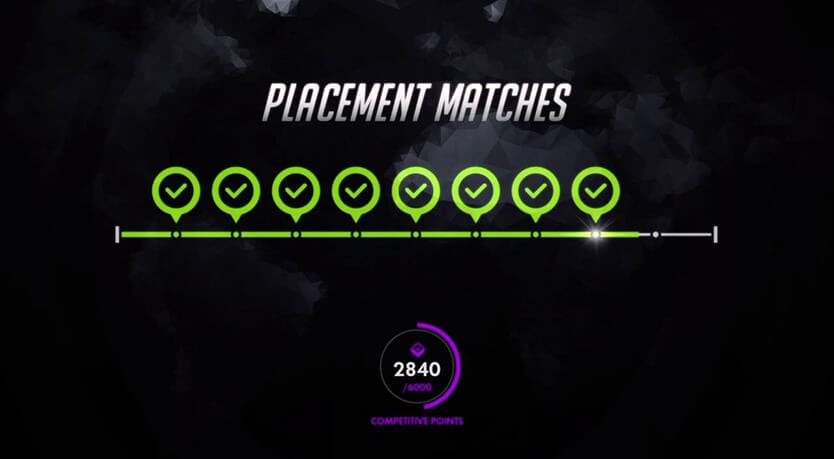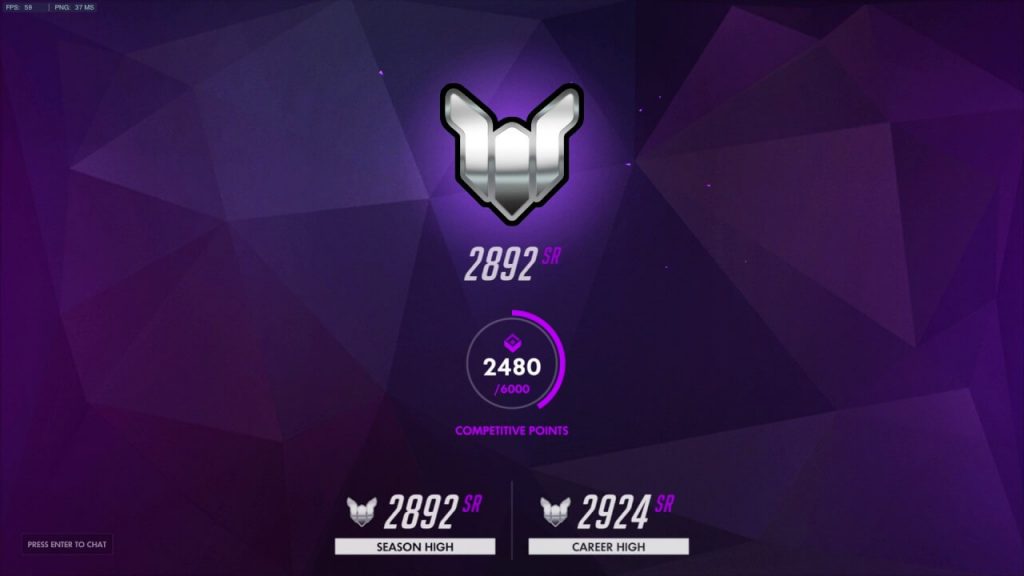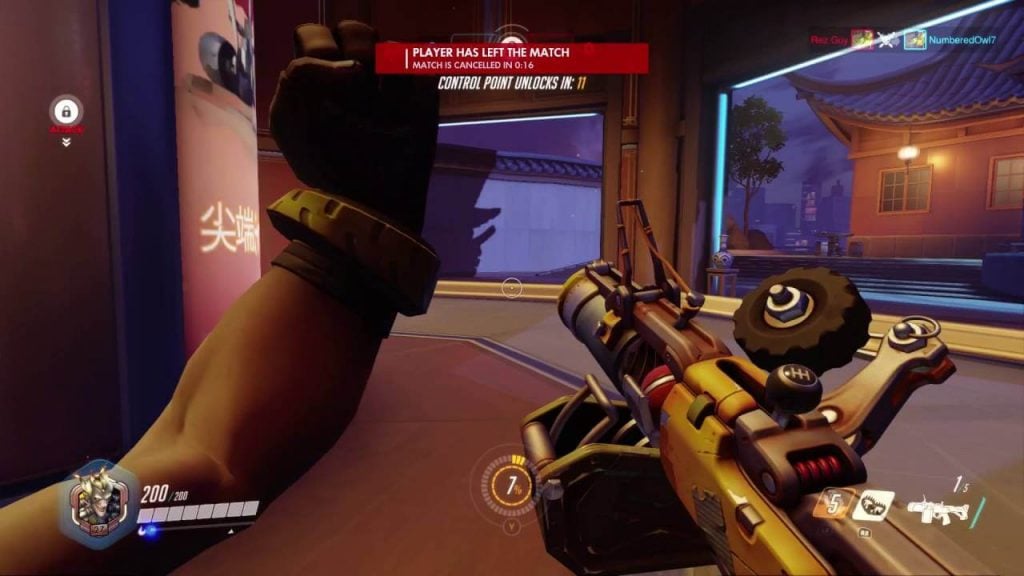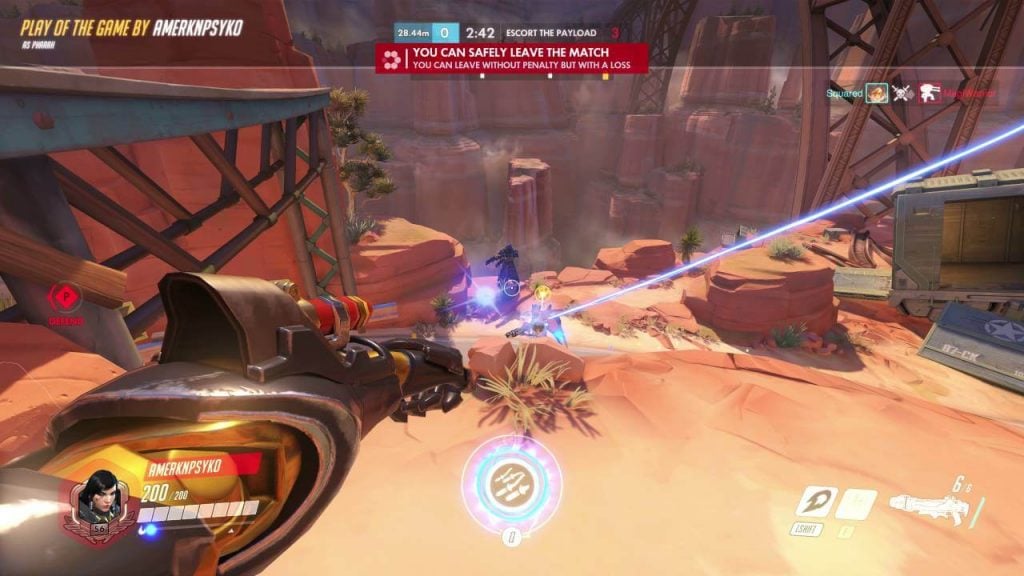Features
Competitive ‘Overwatch’ Needs to Rank Up
The doors to Dorado opened and I flew out like an angry hornet ready to pester whatever defense attempted to halt the payloads progress, avoiding the sight-lines of the upper platforms where I could be picked off by enemies with range. The only adversary on point was a D.Va that our Zen just hit with a discord orb. Her defense matrix pointed at the payload, she wasn’t ready for the Tracer fire into her backside, receiving no support from her allies, McCree and Junkrat, who were forced from the high ground by our Genji. D.Va turned to run, but I promptly de-meched her and finished her with some close-up headshots as my team pressed on.
An ally Moira close behind me made for the rat and cowboy who were forced from their perch by our damage-deflecting cyborg. She threw her damage orb at the two, probably not enough to finish them off, but enough to push them back. It might not have been enough if I hadn’t raced ahead of the orb and sprayed some damage into the two enemies before rewinding to safety as the orb easily did the rest of the work. The remaining enemy supports and tank weren’t enough to stop the tidal wave that was my team from leveling them, demolished by a perfectly synced dive unnatural from a group of solo queuers and admittedly unplanned. As the team kill bell rang and the payload hit its first checkpoint, the match was promptly canceled. One of the enemy players had quit within the first minute (the thwarted D.Va) and my team, after one of the best presses I’d ever seen in my life, was rewarded with nothing but disappointment and a waste of time and effort. C’est la vie of a competitive Overwatch player. But it shouldn’t be.

Season Ten of Overwatch ranked play just ended and, from what I can glean, was one of the least popular seasons in the two year history of the game. Perhaps in response or conveniently ready for the next year of Overwatch, Blizzard have implemented some new systems to combat the frustrating game state including an endorsement system, to acknowledge quality players and teamwork, and an in-game LFG (looking for group). While these outside tools might help, for me, the problem rests within the confines of the Competitive Play mode itself and, unless Competitive Overwatch ranks up and improves with some system adjustments, I don’t have much hope that Season Eleven will be that much better.
Placement Matches
Let’s start where every Competitive season starts: placement matches. Each season is presented as a fresh start, a new opportunity to climb to new heights in ranked Overwatch play. The beginning of that new journey involves players undergoing ten placement matches which determine their SR (Skill Rating) and their starting point for the season. However, as it operates now, these placement matches are, at their best, pointless and, at their worst, infuriatingly restricting. While presented as a fresh start, placement matches are actually essentially a continuation of the last competitive season based on an invisible ranking rather than the visible SR player ranking which is itself being “reset.” This, by itself, makes a lot of sense. As principle designer Scott Mercer explained on a forum post way back after Season Two:
First and foremost, we always want to provide the fairest matches that we can. Fair matches of skill between the teams provide the greatest chance for you to have fun in Overwatch. At the same time, we’d also like every new competitive season to feel like a fresh start. These two goals end up being somewhat contradictory.

To ensure placement matches are fair, Blizzard pairs players based on their invisible MMR, or Matchmaking Rating, essentially tethering them to their respective skill tier so that, for example, a player whose skill equates to Diamond tier level play isn’t matched against a Bronze tier player. It’s a beneficial bookmark keeping players in a healthy starting space, which is not a bad idea at all. The frustrating part is how little impact the ensuing placement matches actually have on a player’s SR outcome. If I am going to end one season in the low Platinum range (around 2600 SR), be tethered to that range by my MMR, end up winning eight out of ten placement matches, only to be placed at low Platinum or even high Gold, what’s the point? If a win typically nets a player around twenty SR, doesn’t it stand to reason that my SR should be closer to mid Platinum range (2720)? If not, then why bother with placement matches, which, for me, unfavorably place me lower than where all of my seasons end because of an invisible number I can’t really impact and because of my blatant refusal to game the SR system. Which, oh yeah, brings us to point two.
Skill Ratings
Despite the controversial system being removed from Diamond tier ranks and above, at lower ranks (Bronze through Platinum) SR is still partially determined by a “Personal Performance Skill Rating.” In theory, this adjustment to the system should have a positive effect for players who outperform their peers, allowing them to rise through the ranks much quicker. However, what this Personal Performance system actually tracks punishes players for focusing on team play, flex picking, playing tank and healer roles properly, and objective play and instead inadvertently promotes self-focused play that ultimately resulted in a rampant One-Tricking epidemic. As many have recorded, the system overemphasizes eliminations and player K/D (kill to death ratio) while underemphasizing other general stats like accuracy, damage blocked, healing done, etc. Consequently, many players keep out of harms reach, ie. off the point, to protect their K/D, instead opting to focus on getting eliminations from a safe distance with picks like Soldier and McCree or carefully picking off the enemy back line with heroes like Tracer.

Rather than comparing player stats across the team and situationally, PPSR measures a player’s performance up against other player performances on the same hero. Again, this seems balanced, but ultimately discourages hero swapping when necessary since a player’s performance on one hero for only half a match probably won’t measure up to the stats of someone who remained on one hero for an entire match. It also means that players who are playing a hero properly are probably reaping fewer benefits than players who are playing the same hero just for kills. I play a lot of D.Va, and playing her properly means aggressing occasionally, such as removing a threat from the high ground, but always falling back to protect the backline and the objective. Compared to an angry bee D.Va who is instead using the character’s mobility and large pool of health to net an immense amount of eliminations, I might have a healthier range of stats like objective time, damage denied, etc., but since eliminations and K/D are so heavily favored (despite Overwatch being a team-oriented, objective-based game), it won’t matter at all.
PPSR also has a negative impact on selection as a result of character popularity. One-tricks (players who only play one hero exclusively regardless of map, mode, or position all in the name of gaming the system) frequently pick niche heroes simply because it’s easier to exceed other player’s stats when fewer players pick the hero. This results in some abysmal team compositions and situations, like being stuck with a short ranged Symmetra versus a long range team. Likewise, players who, quite innocently, have some unique preferences are at an advantage over players whose hero choices are more common simply because the stats to beat for less frequently picked heroes are less competitive. My best friend, Ryan, and I rarely play Competitive without one another. We play differently, but both excel in our preferred positions, frequently holding down all gold medals for a match between the two of us. But because Ryan prefers some niche characters, like Zarya, and hit scans, which promote a better K/D, his SR rank has been better than mine since the beginning as he’s been unknowingly working the SR and PPSR system.

The easiest solution would be to remove the system from all tiers of play so that all that matters is whether a team wins or loses. Alternatively, Blizzard could simply compare all visible stats across the team for a given match, taking all medals and end of game stats into equal account. I recognize this is reductive and much easier said than done, especially when considering the differences in heroes. But aren’t there obvious roles and positions across a team regardless of hero choice? Tracer and McCree operate differently, but they’re both there to eliminate enemy threats. Supports might support differently, but couldn’t Blizzard discern whether you had supported well? At the very least, Blizzard could better recognize a wider range of roles. You earned a gold medal in healing and objective time? You’re rightfully rewarded. Or you played a shield tank and blocked damage? You fulfilled your role and that’s should be recognized. You played Hog and you healed, hooked, and killed? You did a wonderful wealth of things, great work! Doing things this way, medals wouldn’t be meaningless, players could excel regardless of character selection and swapping, players would be incentivized to fulfill their role, and players who carry their team would be aptly rewarded. But an endorsement is nice too…I guess…. It’s not like I’m playing Competitive to rank up.
Cancelled Matches
My final two points are quality of life issues involving players quitting that frequently make Competitive matches frustrating and futile. First, the issue I opened with. If a player leaves a Competitive match within a minute, the game is cancelled, regardless of circumstance. When a player on your team quits a Competitive match at the start and the match is cancelled, it can honestly come as a relief. The other side of the coin is that a highly coordinated team, like the one in my opening story, can come out swinging, masterfully take control of the match, take an early lead only for the game to be cancelled when an enemy player quits, all of that work amounting to nothing but a waste of time.

It’s World Cup season, how about a soccer analogy? In the 2014 World Cup, Clint Dempsey scored a goal in under thirty seconds for the U.S. in a grudge match against Ghana, the team that had eliminated the U.S. from the Cup four years prior. It remains the fifth fastest goal in World Cup history. But what if a Ghanan player left the match then and there and FIFA ruled that the match was cancelled, the standings for both teams remained stagnant, and the U.S. wasn’t awarded with advancement and sweet, sweet revenge? Luckily, soccer doesn’t work that way. In a game with considerably shorter matches than soccer, where one minute can make up a significant fraction of the match time, why should Overwatch work this way?
There’s no justification for match cancellation in Competitive Overwatch at all, especially after a team’s succeeded in securing the first checkpoint. It’s understandable that playing a man down at the outset of a match is detrimental to a team, but it’s absolutely unfair to the other team that had such a beautiful beginning to a game to earn absolutely nothing for it because someone on the other side was a poor sport. Blizzard might theorize that one team dominated early on because it was a bad matchup, but team disorganization is honestly on the head of the players.
Playing Players Down
As it stands, a player that quits or leaves a Competitive match early receives a loss and a penalty. If this happens within the first minute, the match is cancelled as in the above scenario. The majority of the time, however, the remaining team is given a message that if they wait until a two minute countdown is complete, they can leave a match safely, receive a loss and not be penalized for quitting early. Not that they can’t win. I’ve had some incredible five-person holds. But for that win at disadvantage, which makes for a more frustrating play experience, players receive no discernible benefit beyond the standard SR gains. This system is frustrating either way as players are being punished for something completely out of their control and are practically encouraged to quit by the in-game message. Instead, shouldn’t Blizzard encourage players to see the match through?

Rather than encourage quitting and taking a loss, Blizzard should encourage players to finish a match by implementing a system where players who finish a match with an absent teammate receive no loss to SR but stand to gain a substantial amount more SR for winning. To ensure grouped players don’t work the system, Blizzard could rule that the increased SR is only awarded to teams who’ve been missing a player for an extended period so that one player can’t leave at the last minute to benefit they’re soon to be victorious team. They might nullify gains for players who start a match grouped and finish with an absent group member for the same reason. Further, to avoid “bad leaver behavior” as they’ve termed it, Blizzard could increase penalties for leaving and arrive at substantial bans for players and accounts with a record of leaving far quicker. Better to punish a few than the multitude of players punished daily because a teammate quit.
The LFG feature may eliminate the ever-present pain of bad team composition and teamwork in Competitive Overwatch, but there’s no reason for the rest of the mode to feel as harsh, frustrating, and punishing as it currently does. Implementing some of these changes or something similar might be risky or difficult, but if the experience is better for the majority of players and people begin enjoying the game more, isn’t it all worth it? I’m hopeful Season Eleven will be better than Ten, but without more improvement to the overall Competitive system, I wonder how much more time I’ll be willing to give to the mode.

-

 Features4 weeks ago
Features4 weeks agoGet Ready: A Top Isekai Anime from the 2020s Is Headed to Hulu!
-

 Features3 weeks ago
Features3 weeks agoSocial Gaming Venues and the Gamification of Leisure – A New Era of Play
-

 Features3 weeks ago
Features3 weeks agoSolo Leveling Snubbed?! You Won’t Believe Who Won First at the 2025 Crunchyroll Anime Awards!
-

 Culture3 weeks ago
Culture3 weeks agoThe Global Language of Football: Building Community Beyond Borders
-

 Technology4 weeks ago
Technology4 weeks agoIs Google Binning Its Google Play Games App?
-

 Technology4 weeks ago
Technology4 weeks agoHow to Download Documents from Scribd
-

 Guides4 weeks ago
Guides4 weeks agoBoosting and WoW Gold: Why Prestige and Efficiency Drive the Modern MMO Player
-

 Technology2 weeks ago
Technology2 weeks agoGamification and Productivity: What Games Can Teach SaaS Tools
-

 Features2 weeks ago
Features2 weeks agoFarewell to a Beloved 13-Year-Old Isekai Anime That Brought Us Endless Laughter
-

 Features1 week ago
Features1 week agoThis Upcoming Romance Anime Might Just Break the Internet; Trailer Just Dropped!
-

 Features3 weeks ago
Features3 weeks agoWait, What?! Tom & Jerry Just Turned Into an Anime and It’s Glorious!
-

 Culture2 weeks ago
Culture2 weeks agoIs the Gaming Industry Killing Gaming Parties?




















